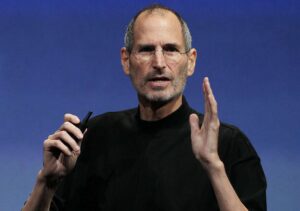
Thirteen years ago, on October 5, 2011, the technology world mourned the loss of Steve Jobs, the visionary who co-founded Apple Inc. His death left a void that seemed impossible to fill.
Now, in 2024, it’s time to reflect on Tim Cook’s tenure as Apple CEO and how it compares to the late man’s iconic era.
Business rise
When Tim Cook assumed the role of CEO of Apple, many questioned whether he could lead the company as effectively as Jobs. The answer, as it turns out, is a resounding “yes”. Cook —though less communicative— led Apple to unprecedented heights, propelling it to become the world’s first company valued at $2 trillion.
While debate continues over whether Jobs could have achieved the same financial results, Cook’s leadership proved too far exceed expectations. Under his guidance, Apple diversified its portfolio, placing a heavy emphasis on services, and deftly navigated the fiercely competitive technology landscape.
The next big things
Steve Jobs had a remarkable knack for unveiling breakthrough products every few years, from the ‘Mac’ to the ‘iPhone’. Tim Cook faced enormous pressure to continue this tradition and did so in his own distinctive style.
For example, the ‘Apple Watch’ has become a huge success, with over 100 million users worldwide. It revolutionized the world of wearables and health monitoring, securing its place among Apple’s flagship products. ‘AirPods’ also turned wireless headphones into a cultural phenomenon, setting new standards in audio technology.
While these products may not have the same impact as Jobs’ creations, they represent Apple’s commitment to incremental innovation. Cook’s Apple focuses on improving existing ideas, just as Jobs did, ensuring that each product surpasses its predecessor.
The little things
One aspect in which Cook’s Apple falls short of Jobs’ legacy is meticulous attention to detail. Jobs was known for his impeccable product development and design skills, stripping away unnecessary features and refining them to perfection.
In contrast, Apple under Cook has occasionally released products with raw details, such as the original minimalist design of “iOS 7” or the “Touch Bar” on the “MacBook Pro”, which divided users. At times it seems that Apple has lost the finesse that Jobs brought to the table, with some experimental ideas that don’t quite hit the mark.
However, the company often redeems itself through improvements in later models. The ‘iPhone’ line, which was once complex and offered confusing choices for consumers, now offers cleaner options, with models that stand out distinctly from one another.
Steve Jobs: The icon of industry
Beyond his role as a business magnate, Steve Jobs was an industry personality with unique characteristics. He embodied the roots of the computer industry, performed an amazing corporate turnaround, and engaged with customers in unique ways. Jobs’ product launches, or “Stevenotes,” were legendary and offered an intimate, human approach.
In the years since Jobs’ death, Apple has struggled to capture that magic. It was as if the soul of the company was missing. But Apple adapted, diversifying its presenters and embracing a diverse workforce. The shift to virtual events, accelerated by the COVID-19 pandemic, has seen Apple redefine its style.
The future of Apple
In 2024, Apple continues to evolve, emphasizing innovation over nostalgia. While Tim Cook’s leadership may lack the theatrics of Steve Jobs, he is driven by the same relentless pursuit of excellence. Apple’s ongoing ventures into “VR/AR” such as the recently announced “Apple Vision Pro” and “self-driving cars” demonstrate its commitment to the forefront.
Although Cook’s leadership differs from that of Jobs, it has brought unprecedented financial success and a new approach to product development. As Apple continues to shape the future, one thing remains certain: the spirit of innovation remains, even without its legendary founder.
Source:

(Συνολικές Επισκέψεις: / Total Visits: 43)
(Σημερινές Επισκέψεις: / Today's Visits: 1)
